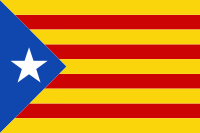After two weeks of campaigning, last Sunday the Catalans
went to vote. The result wasn’t what
anyone expected it would be, and now the Socialists are explaining how their
loss of seats is really a win because they didn’t lose as many seats as the predictions
said they would, or how CIU, going from 62 to 50 seats, really lost. They did lose seats, but by coming in first
and ending up with twice as many seats as the next largest contingent, they
didn’t exactly lose the election.
The results came out thus:
Pro-referendumCIU, 50 seats
ERC, 21 seats
CUP, 3 seats
ICV, 13 seats
Not clear on their position:
PSC, 20 seats
Against referendum:
PP, 19 seatsC’s, 9 seats
Adding it up, you get 87 of 135 seats in favor of
a referendum. That’s 64% of the
parliament and an absolute majority. If
the parties were to actually vote for or against independence, you would have
CIU, ERC, and CUP voting for, ICV has not taken a position, and the last three,
PSC, PP, and C’s would vote no (although there could be several
renegade representatives from PSC who would also vote yes). In any case, taking the party line 74 of 135
would vote yes, making it 54%, enough for a declaration of independence by
parliament.
The reporters tell us what happened, what the
results are. It’s the job of the pundits
to tell us why. Some of them are more
interesting to listen to and make more sense than others, but, for the most
part, they don’t seem to really know. It’s
a lot easier to count numbers than to know and understand people’s motives.
Speaking of numbers, even as late as yesterday,
the Vice President of Spain said to the press that because CIU lost 12 seats in
the Catalan Parliament, clearly, the move for a referendum and independence
lost. Surely it isn’t possible that the
Vice President of Spain doesn’t know that ERC, a political party that has been
around since before she was even born, is first a foremost a Catalan
nationalist party in favor of independence.
So, assuming that someone in such a high political position of power
does, in fact, know, that leaves one with the disturbing thought that she is simply
lying to the Spanish public, in the hope that someone out there believes
her. The other disturbing thought, is that she’s
probably right in her hope. Or possibly,
that because of government cutbacks, she doesn’t have, as I do, a calculator to
add up the numbers and figure out the percentages. In fact, some the Madrid newspapers suffer
from the same handicap as the Vice President.
If you lived in Spain you wouldn't know that pro-referendum and what’s
more, pro-independence parties won the election unless you read Catalan
newspapers, foreign newspapers, or read the Spanish papers but were able to add
and divide.
I wouldn’t normally vote for CIU, but this time I
hoped Artur Mas would win. I believe he
is totally committed to holding the referendum and gaining independence. I also found him to be the most practical and
the most diplomatic, and for this endeavor, both are necessary.
Since the election I’ve been worried about whether
Mas (CIU, and President of the Generalitat) and Junqueras (ERC and head of the
opposition) will be able to work together.
If they don’t, independence won’t happen. CIU is right wing and ERC is left. As things progress, it begins to look like both
are willing to make some compromises. If
they do, this will be the best possible scenario. Because with the two sides, left and right,
working together, more people will be brought into the independence movement
and it will strengthen the movement’s image internationally. If the right and the left both back independence, that shows that a broad segment of the Catalan population supports it. So if they work together there should be a
referendum to vote on in 2013. I do believe
I am witnessing the birth of a nation.
 |
| Photos courtesy of Trini Gonzalez |























